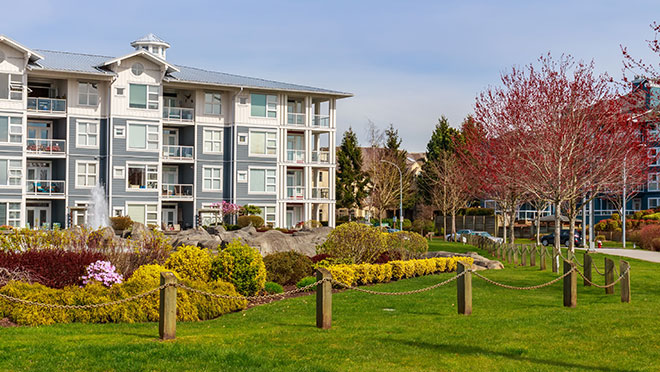Social housing gets a leg up with Fortis, BC Hydro program

Retrofit program helps upgrade common areas of multi-unit complexes
Alliance members are playing a major role in a new program aimed at providing support to social housing units in B.C. The program paves the way for support through an energy study, implementation support and product rebates (or any combo of them) for non-profit housing complexes in B.C. that have a minimum of nine residential units.
The FortisBC-initiated social housing retrofit support program includes a BC Hydro component aimed at improving the efficiency of electric devices ranging from commercial kitchen equipment to heat pumps and LED lighting. FortisBC's website is the main source of program information, as the program centres on natural gas-powered common property equipment including boilers, water heaters and related mechanical systems and controls.
Customers interested in getting help through the program work with BC Housing and through key account managers with either BC Hydro or FortisBC, depending on whether the upgrades are gas and/or electric, or electric only in BC Hydro territory. The role of the BC Hydro Alliance member is to consult on possible upgrades and to assist in filling out a pre-screening workbook, a tool available once an initial application of interest is submitted. Once the workbook is complete, it's submitted to the KAM as part of the application process. Alliance members work with their customers as usual, and customers will receive their energy study or implementation funding (and/or retrofit rebates) from the utilities upon completion.
"The process differs slightly from our regular programs in that it's specifically targeted for B.C.'s social housing customers," says Tanya Perewernycky, BC Hydro program delivery specialist. "It ties in with the province's directive to make things more affordable for B.C. residents and to target GHG reduction."
The BC Non Profit Housing Association has been promoting the program, which kicked off in June 2018, and they work directly with building managers to help determine which stream of the program is best for them.
"They might want a customer to do an energy study to look at a particular system, or may just want a customer to look at upgrading their lighting," says Perewernycky. "They can help direct them to rebates, and if they want assistance in what the new lighting should look like, they'd go to the support option in the program."
Who's eligible, and what's available
The program is open to commercial customers of FortisBC (natural gas or electricity) and/or BC Hydro or municipal utilities who are providers of multi-unit residential buildings with a minimum of nine units. Customers must be housing providers or registered charities who provide assistance to low-income persons and who are one of the following:
- A local government
- Registered housing society
- Registered housing co-op
- A governing body of an Indigenous band that provides housing primarily for low-income households.
Only the common areas of a building complex, including recreational spaces, can qualify for energy conservation measures under the program. Funding and rebates will only be accessed after proposals are approved.
Here are the three options available funding, including funding limits:
- Energy study (up to $5,000)
- Implementation support (up to $7,000)
- Rebates for conservation measures.
"A customer can jump in and do all three, just do the last two, or go straight to the rebate," says Perewernycky. "There are funding limits on the energy study and the implementation support, but there's no limit on the rebates. We also provide tools to help support Alliance members to better assist their customers."
For an energy study, an engineering consultant from the FortisBC approved list must be used. An energy study guide is provided.
While the program's rebates for electricity conservation are based on BC Hydro's business energy saving incentives (BESI), funding differs from BESI in that it's not based on a calculation of energy savings or project costs. "Normally we talk of incentives for customers, but this will be a rebate offer," adds Perewernycky. "It works out to so many dollars per item installed."
Eligible electricity-related products include:
- Commercial kitchen equipment
- Commercial refrigeration equipment
- Heat pumps and electric water heaters
- LED lighting and controls
- Variable speed drives
Natural gas rebates cover:
- Boilers
- Commercial kitchen equipment
- Commercial water heaters
- Mechanical systems and controls
- Windows and insulation
Other considerations, and how to get started
While the social housing retrofit support program only includes upgrades to common property, it's possible to combine the program with BC Hydro's Energy Conservation Assistance Program (ECAP) and Energy Saving Kit (ESK) program to get help for in-suite upgrades.
Get more information on the social housing retrofit support program on FortisBC's program page. To start an application, there are two options, depending on the type of incentives involved:
Contact your FortisBC key account manager or email conservationassistance@fortisbc.com to request an application that involves gas-related upgrades.
If your project involves measures for electricity only, and your building is in BC Hydro's service area (including New Westminster), contact your key account manager at BC Hydro or email alliance@bchydro.com for assistance.